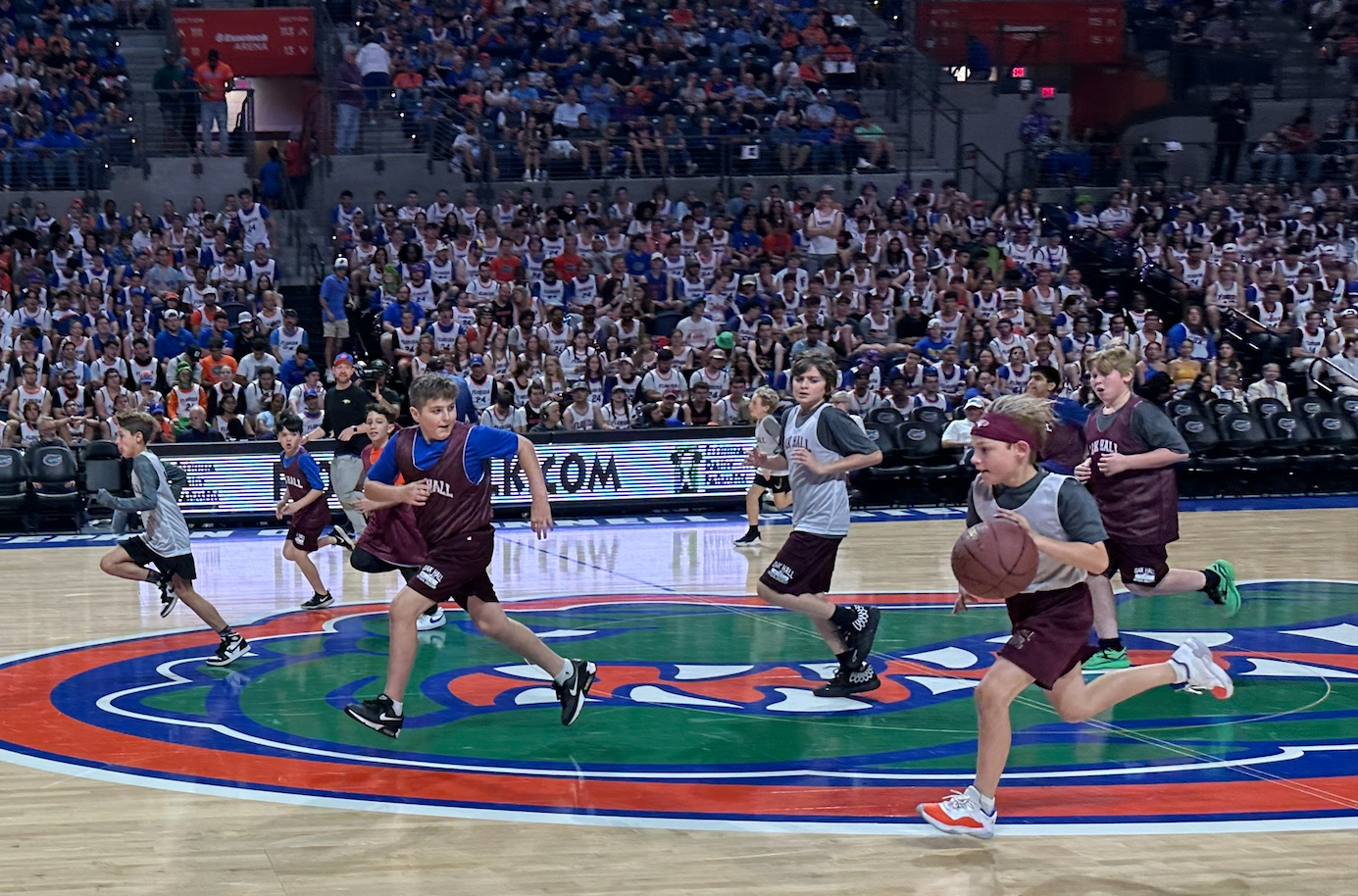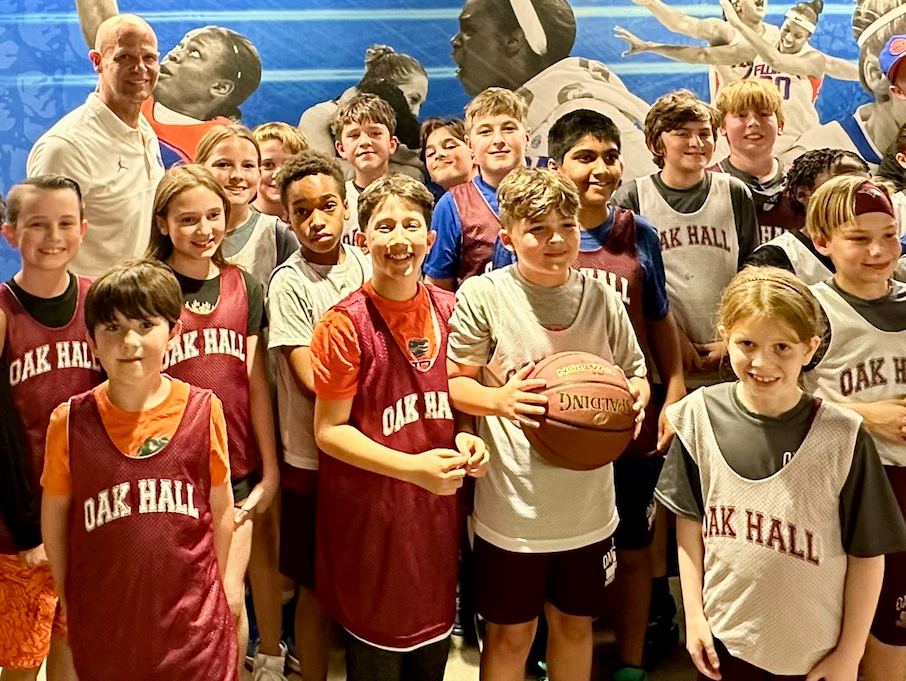Oak Hall School’s Signature Programs Enrich Student Life and Increase Community Engagement
SPARC is dedicated to bringing auxiliary professionals together so they can share strategies to enhance their programs and increase revenue. In addition to providing a platform for members to connect—especially via our SPARC Connect hub, which hosts a wealth of professional resources—SPARC takes a proactive approach to facilitate the sharing of ideas in our community. One way we do this is by traveling directly to schools to observe how individual programs operate, determine what makes them successful, and bring that information back to our SPARC community.
Last week, SPARC Senior Advisors Bob Rojee and Karen McCann McClelland visited Oak Hall School in Gainesville, Florida to observe their extensive extended day programming. “We spent two afternoons observing the programs in action and were impressed with so many aspects,” says McClelland. In particular, two signature programs designed for younger students stood out: Homework Block and the Oak Hall Community Sports League.
Homework Block
The Homework Block, which runs from Monday through Thursday for 30 minutes, was implemented this year for extended day participants. Each block is supervised by a grade level teacher. An auxiliary staff member assists by transferring students, taking them to the bathroom, and performing other tasks that allow the teacher to focus on helping students study.
“The teachers sign up for the program and we pay them a stipend for each day per week that they participate,” says Danielle Tripp, Assistant Director of Summer and Auxiliary Programs. “Some signed up for one day and others signed up for multiple days. We also have a pool of teachers available to sub if needed.” Bringing teachers on board also provides additional staff during the busiest time of the day.
Kids like the quiet time to work in smaller groups and having teachers available for questions. Middle school students can choose to attend Homework Block. “They are more likely to attend when there is a large test or project coming up,” says Tripp.
In addition to observing the program in action, McClelland and Rojee held a focus group of parents to hear their feedback. “They were all very supportive of the homework block,” they say. “Parents appreciate their younger children being mostly done with homework, which allows for better family time after a long day.”
The new Homework Block initiative has been a win for everyone involved. Participants get focused time to work in a quiet, teacher-supervised classroom. Parents know their kids will have most, if not all, of their work completed when they get home. Auxiliary staff receive extra help during extended day, and teachers are incentivized with a stipend and the flexibility to sign up for one day a week or more.
Community Sports League
 The Community Sports League is open to the Gainesville community. “We welcome any child, family, or school from ages Junior Kindergarten to Grade 5,” says Jeff Malloy, Director of Operations for Oak Hall and former Director of Athletics.
The Community Sports League is open to the Gainesville community. “We welcome any child, family, or school from ages Junior Kindergarten to Grade 5,” says Jeff Malloy, Director of Operations for Oak Hall and former Director of Athletics.
Born from the failure of a third-party vendor to properly operate a sports program, the Community Sports League began in the 1998-1999 school year by offering two seasons of soccer and one season of basketball. When the school resumed varsity football in their high school during the 2005 season, the Community Sports League responded and added flag football in 2007. During the same time, they implemented a running club to support what was already a strong running program in the older grades.
“We’ve continued to grow,” says Malloy, emphasizing the popularity of the program. “We’ve added more seasons and offerings for running club and added other sports as a “skills and drills” type of clinic, including cheerleading, swimming, lacrosse, and volleyball.” Participants in flag football, soccer, and basketball compete with other Gainesville area schools.
Varsity coaches or area professionals coach many of the league’s skills and drills clinics, and volunteer parents coach the team sports which compete. Varsity coaches sometimes run clinics for parents to help them feel more confident in their ability to guide the student athletes. The program also provides structured rule books and an on-site director for the league who is always available to help.
While providing an excellent sports experience for area kids and generating revenue for the school, the program also acts as a pipeline for prospective students. “We hear frequently from families at open houses that a summer or auxiliary program, including the Community Sports League, influenced them to consider us as a school year option,” says Malloy. Staff are currently working with the Enrollment Management Team to develop methods to track the effect of sports league participation on likelihood of applying to Oak Hall.
 Recently, 20 fourth and fifth grade basketball players performed at halftime during the NCAA game between the University of Florida Gators and the Auburn University Tigers. “The Gators are undefeated when the Oak Hall Community Sports League is the entertainment,” says Malloy. As an added thrill, the kids got to meet 1996 Heisman Trophy winner and National Championship Gator Quarterback Danny Wuerffel (pictured left). “I really appreciate the support of our programs,” says Malloy, “and I’m happy to speak with other schools who may have an interest in replicating what we do.”
Recently, 20 fourth and fifth grade basketball players performed at halftime during the NCAA game between the University of Florida Gators and the Auburn University Tigers. “The Gators are undefeated when the Oak Hall Community Sports League is the entertainment,” says Malloy. As an added thrill, the kids got to meet 1996 Heisman Trophy winner and National Championship Gator Quarterback Danny Wuerffel (pictured left). “I really appreciate the support of our programs,” says Malloy, “and I’m happy to speak with other schools who may have an interest in replicating what we do.”
Like the Homework Block, the Community Sports League provides tremendous value on multiple fronts. Connecting the school with the community at large, the program offers area kids a great sports experience, gives parents the chance to get involved, supports the older-grade sports by training younger athletes, and influences families to consider Oak Hall as their kids’ full-time school.
What the Homework Block and Community Sports League have in common is how they were created to fill a void in an existing or unsuccessful program. Oak Hall had homework time in extended day, but wanted to try something more structured and supported by paying teachers to get involved. If a hired vendor had created a well-running sports program in Gainesville, perhaps Oak Hall would not have felt the urgency to build and grow the Community Sports League.
Both circumstances echo words of wisdom from McClelland and Rojee. “Don’t be afraid to try something new,” McClelland says, adding that even a failure can lead to something extraordinary. And as Rojee has stated, we should all learn to “jump in the puddle.” If something doesn’t work, don’t be afraid to take a risk to move forward. One bold jump could lead to a highly successful program.
